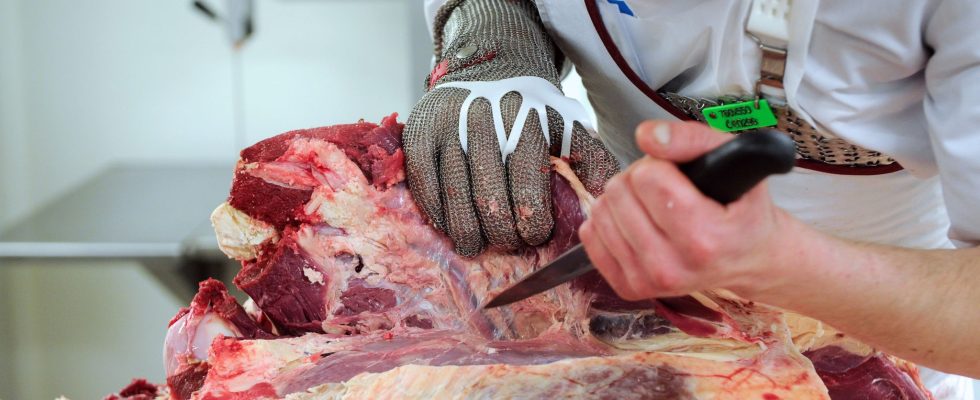Around a barbecue, a vegetarian table, in the media or in politics, the subject of red meat consumption remains sensitive. The scientific data, on the other hand, accumulates year after year, and their conclusions are increasingly clear. Overconsumption of red meat is harmful to health and increases the risk of developing cancer and cardiovascular disease. This is what the World Health Organization points out, in a new report published on July 10. The document, which analyzes all the scientific data available on the subject, confirms and reinforces its opinion on the question, that she had already formulated in 2015.
The WHO thus confirms that beyond 300 to 500 grams per week, the consumption of red meat – which includes beef, veal, pork, lamb, mutton, horse and goat – can increase the risks of colorectal and bowel cancers, and cardiovascular diseases. Processed and ultra-processed meats, such as salami, ham, nuggets, etc., prove to be even more dangerous, since the links with an increase in the risk of cancer are established from consumption greater than 80 g per week. The WHO classifies processed meats as Group 1 carcinogens, meaning that the evidence linking their consumption to an increased risk of cancer is strong and consensual.
“These results appear logical because the saturated fatty acids, iron and nitrites, contained in these red and processed meats, are known risk factors for cancers, in particular of the colon, and the salt of processed products can increase cardiovascular diseases and hypertension, says Antoine Flahault, epidemiologist, director of the Institute of Global Health and professor at the Faculty of Medicine of Geneva.There are therefore plausible explanations allowing to say that the overconsumption of red meat can be at the origin of health problems, but keep in mind that separate factors may come into play, such as the fact that people who eat too much red meat may have other health-damaging behaviors – overeating, drinking too much sugar, smoking, etc. – even if studies on the subject adjust their results by taking these parameters into account.”
The WHO adds that the production methods of red and processed meat can be accompanied by other health problems, including antimicrobial resistance due to the excessive use of antibiotics in animals, or the increase in diseases. which are transmitted from animals to humans. She points in particular to the intensive farming practiced on an industrial scale, the “fattening parks”, the practice of which is spreading in developing countries and the new great powers, such as China or Brazil.
The necessary regulation of consumption in Western countries
The international body also indicates that red meat is an important source of iron, vitamin B and all amino acids: essential nutrients for growth, development and health of human beings. She adds that they can also be found in beans and legumes, which are rich in iron and vitamin B, even if they come in a form that is less easily assimilated by our digestive system. Moreover, the WHO obviously does not suggest that populations suffering from malnutrition avoid the consumption of red meat. On the other hand, high-income countries, mainly Western countries – including France – which exceed the recommendations would benefit from reducing their consumption. Ideally, their inhabitants should avoid processed meat and favor meat raised in better conditions, or even vegetables, or even white meat and fish.
“This is a sensitive subject and it should be moderated. It can be good to eat red meat, and if the risk of increased cancer linked to overconsumption exists, it is not comparable to the risks of tobacco or alcohol, specifies Antoine Flahault. The report is therefore right to emphasize the nutritional value of red meat, while insisting on the need to moderate its consumption. Especially since at 300 to 500 g of red meat per week, we are still far from abstinence!”.
Red meat, the main emitter of greenhouse gases
Finally, the WHO recalls that the production of red meat has an impact on our ecosystems, on the one hand because livestock farming itself generates greenhouse gases (GHGs) which contribute to global warming, but also because that it causes the deforestation of the territories via the creation of fields where ruminants can graze or fields of cereals and soya intended to feed intensively farmed animals. Trees not only capture CO2 and produce oxygen, but they also protect biodiversity. “Livestock farming accounts for around 80% of all GHG emissions from the agriculture sector, which itself is the source of around 30% of GHGs in the world, specifies Antoine Flahault. the consumption of red meat in the West would allow everyone to contribute personally, and in a fairly substantial way, to the reduction of GHGs and their environmental footprint”.
For years, many experts have believed that global production and consumption of red meat is no longer sustainable in the long term. And if they believe that personal decisions of moderation or change of diet are important, they recall that States must also act, for example by modifying their policies which frame their food systems in order to give priority to the health of people. and to the environment. As pointed out in an article by The Conversationthere are many solutions: changing production methods – for example by investing in agro-ecological agricultural practices, i.e. the systematization of livestock areas where trees and shrubs are kept in order to protect biodiversity – , create more drastic standards or taxes for ultra-processed meats, penalize the excessive use of antibiotics or even subsidize healthier diets.
